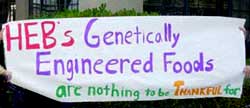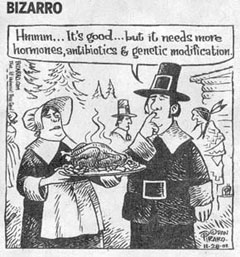Advocates Ask HEB To Label Altered Foods
By Kris Banks (Daily Texan Staff)
November 26, 2002
Genetically modified' ill-defined, chain says
Consumer advocacy groups called for HEB Grocery Company, the biggest food retailer in the state, to label genetically modified products Monday. The company says it cannot until the term "genetically modified" is better defined.
Say No to GMOs, an organization opposed to genetically modified organisms, sent products from HEB to Genetic ID, a food-testing company based in Iowa.
Genetic ID found that Hill Country Fare-brand cornmeal was composed of 14.4 percent genetically modified material.
Hill Country Fare products are not manufactured by HEB but are exclusively distributed by the chain. They are what HEB regional public affairs director Kate Brown called "value products," meaning they are cheaper.
Genetic ID also found that HEB-brand tortilla chips consisted of 0.2 percent genetically modified material.
John Fagan, chief scientific and executive officer at Genetic ID, said their tests are internationally recognized as accurate. The company compares molecules in the tested product to molecules from organic and modified products.
Luke Metzger, director of Texas Public Interest Research Group, said genetically modified products pose potential dangers because of the possibility of allergies, and HEB should let customers know when they are buying modified products.
Genetic modifications also frequently add antibiotics, which could cause problems in the future, he said.
"The antibiotic buildup in 10 years could make us vulnerable to several diseases," Metzger said.
Metzger cited the Flavr Savr, a genetically modified tomato marketed in 1994. The Flavr Savr was found in food and Drug Administration tests to cause lesions in the stomach of rats.
There is no proof of harm to humans from the Flavr Savr, and it was taken off the shelves soon after its release because of unpopularity.
Metzger said the groups are targeting the store because HEB is a socially responsible company, and they don't believe the government will act.
"The federal government has failed to protect consumers," he said. "That's why we're demonstrating to the food companies."
Brown said the FDA has not defined what constitutes a genetically altered product, making it impossible for the store to label products.
She said that while they have discussed the matter with the opposing groups and will continue to do so, there is neither proof to require labels nor customer demand for them.
"There's a lot of data that the health benefits are incredible," she said. "This is a controversial issue."
Brown said internal customer surveys have revealed that their markets are not concerned with the dangers of genetically modified products, and that they trust HEB with the safety of their food.
Fagan said that more than 30 percent of corn crops in the United States are genetically modified.


